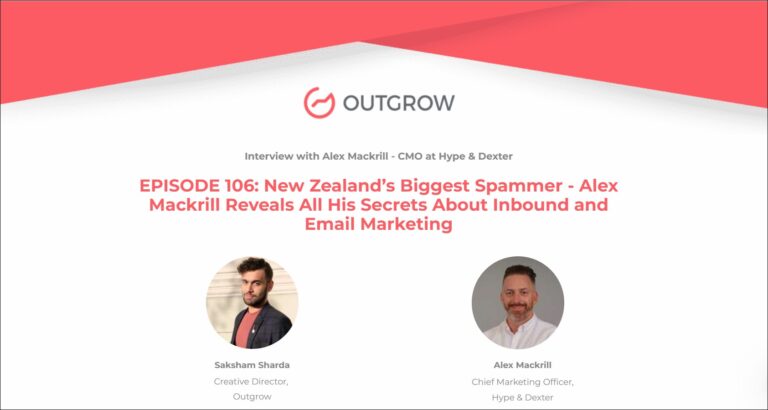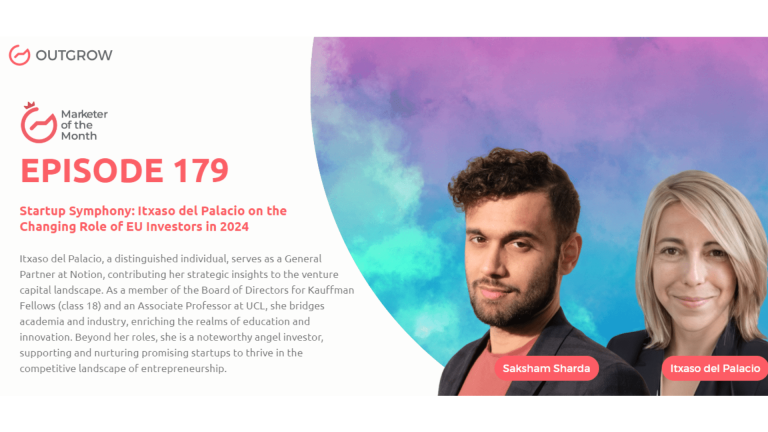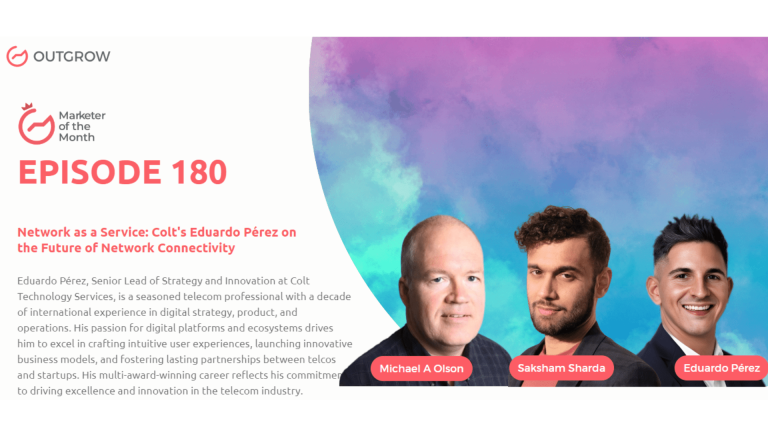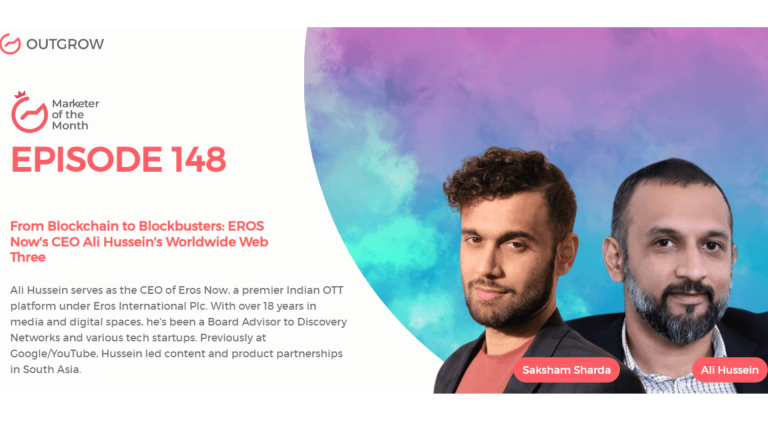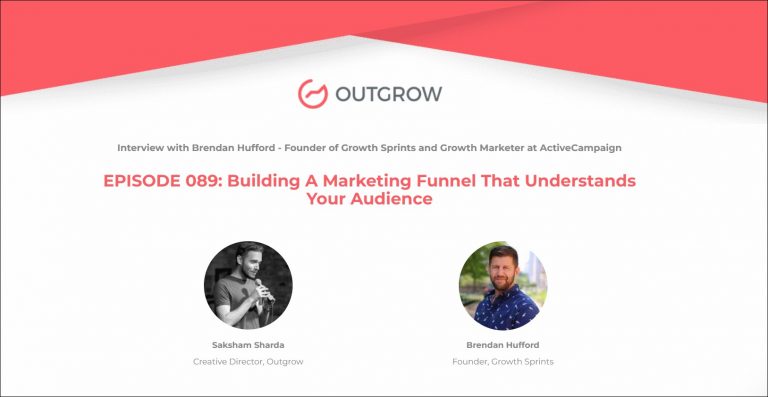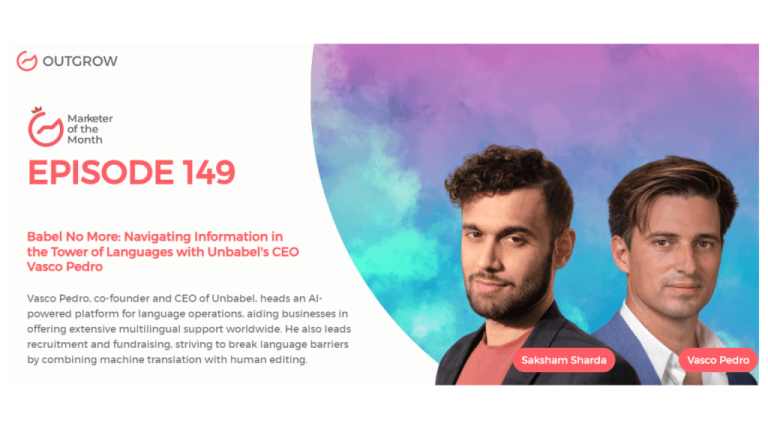Summarize with :
EPISODE 093: Marketer of the Month Podcast with Jen Spencer
Table of Contents
Hey there! Welcome to the Marketer Of The Month blog!
We recently interviewed Jen Spencer for our monthly podcast – ‘Marketer of the Month’! We had some amazing insightful conversations with Jen and here’s what we discussed about –
1. Future applicability of cloud-based SaaS
2. Impact of long term remote work on work culture
3. Ecosystems – community-led growth, second-party data & marketplaces
4. Transforming your customers into evangelists for your brand
5. Why integrating with leading platforms in their category is a must-have for startups
6. Leveraging the power of ecosystem-driven marketing
About our host:
Dr. Saksham Sharda is the Chief Information Officer at Outgrow.co. He specializes in data collection, analysis, filtering, and transfer by the means of widgets and applets. Interactive, cultural, and trending widgets designed by him have been featured on TrendHunter, Alibaba, ProductHunt, New York Marketing Association, FactoryBerlin, Digimarcon Silicon Valley, and at The European Affiliate Summit.
About our guest:
Jen is CEO and a Forbes Council Member, leading SmartBug Media, a globally award-winning intelligent inbound marketing agency. Jen and her team are helping businesses grow revenue by generating leads, engaging accounts, and building brand loyalty through inbound marketing, sales enablement, revenue operations, web development, digital strategy, marketing automation, and public relations.
Insights on SaaS, Remote Culture, and Ecosystems From HubSpot’s #1 Elite Partner Agency
The Intro!
Saksham Sharda: Hi everyone. Welcome to another episode of Outgrow’s Marketer of the Month. I’m your host, Dr. Saksham Sharda. I’m the creative director at Outgrow.co. And for this month we’re going to interview Jen Spencer, who’s the CEO of SmartBug Media. Thanks for joining us, Jen.
Jen Spencer: So glad to be here.
Don’t have time to read? No problem, just watch the Podcast!
Or you can just listen to it on Spotify!
The Rapid Fire Round!
Saksham Sharda: So Jen, we’re going to start with a rapid-fire round just to break the ice. You get three passes, in case you don’t want to answer the question, you can just say pass. But try to keep your answers to one word or one sentence only. Okay?
Jen Spencer: Okay.
Saksham Sharda: Alright. So the first one, at what age do you want to retire?
Jen Spencer: Maybe 70.
Saksham Sharda: Okay. How long does it take you to get ready in the mornings?
Jen Spencer: 45 minutes
Saksham Sharda: Which item is worth spending more money on?
Jen Spencer: A nice handbag.
Saksham Sharda: And what is one thing you regret spending money on?
Jen Spencer: Pass
Saksham Sharda: What movie do you enjoy quoting the most?
Jen Spencer: Elf.
Saksham Sharda: Who’s your favorite Disney character?
Jen Spencer: Pass.
Saksham Sharda: What are you most looking forward to in 2023?
Jen Spencer: Continuing to grow Smart Bugg and hire more people.
Saksham Sharda: Pick one – Mark Zuckerberg or Jack Dorsey?
Jen Spencer: I’m gonna go with Zuckerberg.
Saksham Sharda: Okay. The biggest mistake of your career?
Jen Spencer: The biggest mistake, not trusting myself.
Saksham Sharda: How do you relax?
Jen Spencer: Good Scotch and Netflix.
Saksham Sharda: How many cups of coffee do you drink in a day?
Jen Spencer: One to one and a half.
Saksham Sharda: A habit of yours that you hate?
Jen Spencer: Sleeping
Saksham Sharda: At what time of day are you most productive?
Jen Spencer: Afternoon.
Saksham Sharda: Really? Okay. And the last one is your favorite Netflix show?
Jen Spencer: There are so many. I think the “Queen’s Gambit”, was amazing.
The Big Questions!
Saksham Sharda: Okay. So tell us more about how come your afternoons are productive. Most people say mornings.
Jen Spencer: I’m not a morning person. And I think it’s partially because Smart Bug is a fully remote organization. We’ve got people all over, mostly in North America, but everyone, a lot of people are on the East Coast, so, and I’m in Arizona, so I’m on Pacific Time or Mountain Time, depending on the time of year. And so I’m booked with meetings and connecting with people in the morning. And so the afternoon is when I get to like, get into my groove and just play music and kind of like put my head down and do more deep work. And yeah, I’m more of that like afternoon into the early evening, kind of a work in my groove. It’s quieter.
Saksham Sharda: Fair, okay. So let’s jump to the main question. The first one is, do you believe that whatever the economic scenario that businesses will continue to evolve and the relevance of cloud-based SaaS will only increase?
Jen Spencer: I mean sure. Right. I think it just depends. I hate to say it. Well, it just depends, but it does, right? And as long as the platforms are out there, the cloud-based SaaS that is being produced and marketed, and sold is helping people. If it’s helping people achieve a goal, and do their jobs better, then that’s only going to continue to grow and evolve. So I think it just comes down to, especially during challenging economic times, although this is true at any time, is you have to look introspectively and say if we did not exist tomorrow, what would that loss be? And, you know, how significant would that be? So that’s just the frame that I would encourage people to look through.
Saksham Sharda: And how would you put that frame for your own company? So if your company doesn’t exist tomorrow, tell us the list there would be, as an example.
Jen Spencer: Yeah, but we do support SaaS companies. And so I think about our clients and we have, well over a hundred clients that are depending on us every day to help them achieve their revenue goals. And we’re working very closely with them and owning their goals as if they were our own. And so it would be extremely traumatic for those clients and all of the entities that those clients serve. All of those clients kind of customers and whether they’re current or future customers and stakeholders. So if we didn’t exist tomorrow a lot of people would not be in a good place.
Saksham Sharda: So you mentioned remote culture. So what is your take on remote culture? Do you believe that long-term remote work will have a negative impact on work culture or not?
Jen Spencer: No, I don’t. I mean, I have to say before coming to SmartBug, I had never worked in a fully remote environment before. I travel a lot, so I worked from lots of hotel rooms and conference rooms, and coffee shops while I was out and about. But I always had a home office to kind go back to, but I also managed hybrid teams and that was challenging. So I feel for all of those team members and managers who are embracing hybrid work, I think it can work, but I think it comes with its own unique set of challenges. But at SmartBug, we’ve always been remote. So we’ve been around for 15 years now and from day one remote, and we will always be, and it was the first time I had worked in a remote environment and I was scared because I may get in front of people, build culture, like feed off of the energy in a room kind of person. And I was really worried about that. But because we built our culture with the intentionality of knowing, okay, we’re remote, so, but how do we build connections with each other, and what do we need to do intentionally to make sure that we’ve got that company culture that we want? Because we’ve done that. We have a very vibrant culture and people at Smart Bug know each other far better and are firmly more connected than teams that work together in the same room, you know, right up next to each other in other companies that I’ve worked at. So I’m excited about it. But it doesn’t mean that everyone’s gonna succeed. It means, you know, it’s you have to look at what is your company like, what is your business, what you do. How do people collaborate? And are you gonna make the investments that you need to make in the way that those teams function? And you can’t just phone this in be successful that way.
Saksham Sharda: And so how about your clients? Are they also happy with very remote or hybrid or what’s up for them?
Jen Spencer: Yeah, a mixture, right? We’ve got clients who are all in office, you know companies. We have clients who are hybrid. We have some that are leaning into being fully remote. So a little bit of everything. But I will say all of our clients, know that we are completely remote, so we already know that they’re comfortable with that. And so it’s something that pre-pandemic used to come up here and there, right? Some people would have a hard time picturing how can you get work done. How can you be collaborative when you’re not all in the same place? And for those people, they might end up choosing an agency that’s local to them that can meet with them in person and have that in-person FaceTime. But you know, post-pandemic, now it’s, everyone’s eyes are opened a little bit more and like this maybe this does work. Okay. So I think our clients are happy that we’ve got talented people and they just want the work to get done and they wanna hit their goals. And then for as far as their own business, that’s unique to them.
Saksham Sharda: And so where would you say is the best way to transform your customers or your clients into evangelists for your brand in general?
Jen Spencer: Well, I think it starts with just doing really good work for them. So doing what you say you’re going to do, and I know that sounds like table stakes to me. That’s table stakes, do what you said you were going to do. Unfortunately, there are a lot of marketing agencies that don’t do what they say they’re gonna do. So we never wanna be one of them. We always wanna make sure that first, it’s when we bring a client on, we wanna make sure that we believe we can make them wildly successful. So it means we’ve got a pretty in-depth discovery process on the sales side of things because if we don’t think we’re gonna be able to help somebody, it’s not gonna benefit any either of us, right? For us to take on that client, That short-term kind of win is not a win. So that’s the first thing, really making sure there’s a good fit and we think our intelligent inbound methodology is gonna help them. Then it’s understanding their business and dedicating the resources upfront to making sure that we’ve got good synergy and then it’s executing the plan and iterating. So looking at data and seeing, okay, this is what our hypothesis was for them, for their marketing strategy and their goals. Here’s what we’re seeing, kind of as early as we can, what are the results we’re seeing and how do we wanna adopt? And if we do that then our clients hit their goals, then our clients leave us reviews in third-party places. They serve as references for us, and they champion our content on social media platforms where we know we’re attracting other potential customers. So it all comes down to doing great work for our people.
Saksham Sharda: Again, speaking of the kind of work that is done nowadays, do you believe that for startups and specialist apps integrating the leading platforms in their category has become a must-have not nice to have a requirement to win customers?
Jen Spencer: Definitely. It’s a must-have. I was just reading an article before we joined this conversation about connected systems and how 80% of marketers, and this was an article that HubSpot published, 80% of marketers believe that having the right data, and having personalized experiences is far more important now than ever before for reaching financial potential customers. But half of the marketers don’t feel they’ve got the data that they need to make that possible. And I believe it. Just in the sales and marketing roles, I’ve sat in myself and what I’ve seen of our clients and our partners. And it is challenging when you don’t have those systems integrated and as you grow, it just becomes more challenging. So if there’s something that I wish I would’ve done, you know, when I joined Smart Bug in 2017, we were 28 people today in 2022, we were over 175 people. Just like a frame of reference for the size of the growth. And I wish there are certain things, systems we would’ve integrated then because now you get busy and there’s so much to do and there’s so much data flowing through your systems. And if they’re not connected, you’re missing out on signals that could inform your strategy and help support your goals. And so as early as it makes sense to do so for your business, I highly recommend it. Because you don’t wanna be in this place where you’re then trying to play technical debt catch up when you really should be putting your foot on the gas and, you know, going for that next phase of growth.
Saksham Sharda: So could you give examples of some of your clients who have managed to do this?
Jen Spencer: I can’t share client you know, specific client information necessarily. Although I guess I will say one of our clients, cause we have a published case study the Arbor Company. So they’re an organization that has senior living communities which a lot of our clients, I know it’s not on the stats, we’ve been talking about software, but in that senior living space they’ve got multiple locations and they run a lot of different kinds of advertising. So they’ve got digital, right? And they’re practicing inbound, but there’s also traditional advertising because that demographic and that market, it still makes a lot of traditional advertising, still makes a lot of sense, but how do you blend the traditional, like offline marketing with the digital online? And so through using certain tools like CallRail, which will help and integrate that with HubSpot as their marketing platform, we can track which ads, and which offline types of advertisement are contributing to inbound calls. And we can see which publications are performing the best and which regions are performing the best. And so that’s an example of something back in, if I take myself myself back, 10 or 12 years, and when I was running marketing and doing a lot of offline advertising, you just had to kind of guess, right? Like you would say, well, we spent X amount in radio and TV and newspaper and IT land they launched on these days and we saw an uptick in sales on these days. And so you could make some correlations, right? That was the best you could do. Now our client Arbor can draw a direct line to this specific ad that resulted in this call that came in that got this booking that resulted in this new resident moving in. So it’s pretty cool.
Saksham Sharda: So how do you think the entire offline versus online advertisement thing is now going, not considering the online ads are now also fluted with bots?
Jen Spencer: I don’t know. I have to say our focus is so much more on organic and paying attention to some of those intense signals. So while we do a lot of paid media for our clients I wouldn’t, that’s not what we lead with as an organization. So I might just not be the best person to answer that question for you right now.
Saksham Sharda: So going back to ecosystems then, almost every major SaaS category has thriving ecosystems of software and service firms who grow around core platforms. So would you agree that community-led growth and second-party data marketplaces are ultimately all ecosystems?
Jen Spencer: Yes. I do firmly believe so. And I think the idea of the idea of a community, I mean lemme back up and say when we previously thought about ecosystems, I think about it through the lens of the channel and doing a lot of work in channel sales and channel marketing and creating this army of basically volunteer salespeople who are, have some, there’s some other reason why it makes sense for them to be recommending your business, but it’s because there’s this sort of secondary benefit that they’re getting from recommending you that, but that is powerful to have someone who’s not your brand, right? Like a partner say, Hey, this is a platform I recommend and this is a solution I recommend that’s effective and powerful in and of itself. Now you take a community of users and evangelists, they have nothing to gain, right? There’s like no financial benefit, right? I mean, maybe there’s something that the brand is doing to incentivize those people, let’s put that aside because they’re not in a sales kind of position. It’s not, you know, very obvious that they’re getting something from this. In the same way as influencer marketing, if you’re very familiar with that, you might kind of make that correlation. But these communities have these people who are evangelizing the products that they’re using. It’s pretty huge. And so those brands that have found a way to tap into that, to invest in those communities and grow them, that’s now become an ecosystem that is significantly more powerful or can be significantly more powerful than your traditional channel kind of ecosystem. That is what started all of this.
Saksham Sharda: True. And I was gonna say, that ecosystems are everywhere now to the tune of 70 trillion according to McKenzie. What else are some of how businesses can leverage the power of this ecosystem-driven marketing?
Jen Spencer: Well, I think we hit on a couple of those things. So one, it might be through technology partners that you have, but when you bring on some kind of a partner, there’s a win-win where you are referring or co-selling, collaborating on deals with each other, would look at, well, how do you leverage more from your shared marketing efforts and how do you, how do you layer your editorial calendars, your campaigns together to do more together? Right? We’ve got countless examples of, you go alone, you do something alone, right? You can be successful, but if you partner with someone else, that is how that compounds and one plus one equals three, not two, right? So we’ve seen that happen. And I think that’s sort of traditional, right? Traditional digital partnership ecosystem. But so many businesses, so many leaders are just now kind of recognizing that as an opportunity. But the other thing with your evangelists, it’s figuring out, as you all have, everyone has a community. They have an ecosystem. Even if you don’t think you do, you do, right? Because you have people who are using your product or services and they have an opinion about it and they are talking about it whether online or offline. And so it’s up to you as that brand to say, how do we wanna corral this information? And there are so many different ways you can do that and different technology and different programs that you can implement. But I think it’s right there. It’s right for the taking people wanna make that investment.
Saksham Sharda: And how come this is something that is coming to the fore now? What’s happened in tech that the discussion about ecosystems has come to the fore now and not before?
Jen Spencer: Yeah. I think it’s a few different things. I think, first of all, the proliferation of social media and the way people engage and just the capacity to kind of connect is key when none of this will be possible without that technology. Second, as people faced the eco, I’m not saying that the pandemic caused this by any means, right? But as people were sort of forced apart in a lot of ways they then needed to lean into something to get that sense of community and connect with people. And so you start leaning into different online channels and kind of starting to join groups that maybe you otherwise would’ve not because you didn’t have the time or the space or you were getting fulfillment, like personal and professional fulfillment from other parts of your life. So I think it opened that up. And now even though people are interacting and going back into an office and going to events, there’s still so much value that’s coming from those online interactions that people are recognizing, Hey, I wanna continue to invest here. And finally, it’s through more advanced marketing attribution and sales attribution technology, we’re able to see the impact. So if you can measure it, then you can start to look at how I scale it. How do I grow it, right? And you’re tracking it. And so then it becomes something that your C-suite is more willing to fund if they see that attribution. And so it’s all of those things kind of all coming together that I think are pushing this idea of the ecosystem and community-led growth into the forefront right now.
Saksham Sharda: So speaking of like tech evolving, marketers usually rely on MarTech to equip them with the skills needed to compete in constantly changing and evolving markets. So what key factors in your experience will lead marketers to look for alternatives to major MarTech apps?
Jen Spencer: I think it’s going to be reliability. So I mean that’s pretty huge. So the platform you use every day and you go and log in and, you know, once a week, let’s say. I’m just pulling this out of thin air, but things aren’t firing off the way they’re supposed to. They’re gonna switch. They’re gonna go look for something else. And the other thing is, I think it’s simplicity. I think we’re overwhelmed. I think their marketers have so much on their plates and you know, I make jokes about like being a Swiss army knife marketer who is like, what did you just have to do everything right? And it’s if anything kind of remotely sounded like marketing, it kind of fell on marketing shoulders. And guess what, almost everything remotely sounds like marketing these days. So, it’s overwhelming. So systems that are better connected and do more for their customers or I guess on the flip side, the question was like, what would cause someone to leave? It’s if the systems aren’t connected if they’re not speaking to each other if platforms don’t do maybe they’re too shallow in that they look to have a robust feature set, but actually only like two or three out of the five features, let’s say they have, are really kind of best of breed and everything else is sort of subpar. That’s gonna be in the armor because marketers need complete systems. But they need it to be simple and alleviate some of the stress of their workday.
Saksham Sharda: And speaking of like, you like the industry or work again, but the last question for this podcast usually is, so what would you be doing in your life, if not this?
Jen Spencer: What would I be doing in my life if not this? It’s really interesting. It’s hard. So I’m gonna say this. So I started my career as an English and theater arts teacher, but then worked for eight years in non-profit performing arts, in public relations, marketing and sales. And so there’s a piece of me that would go back to the nonprofit space because I see that there are so many nonprofit organizations that are still what I feel like light years behind and could be so much more effective if they were able to make some investments in technology. It could actually, I think pay off dividends for them. And so in another life, right, I’d love to go back to nonprofits and help them usher a nonprofit into today’s modern digital marketing age
Let’s Conclude!
Saksham Sharda: Okay, that was the last question. Thanks, everyone for joining us for this month’s episode of Outgrow’s Marketer of the Month. That was Jen Spencer. Thanks for joining us, Jen.
Jen Spencer: Thank you. Glad to be here.
Saksham Sharda: Check out the website for more details and we’ll see you once again next month with another marketer of the month.





